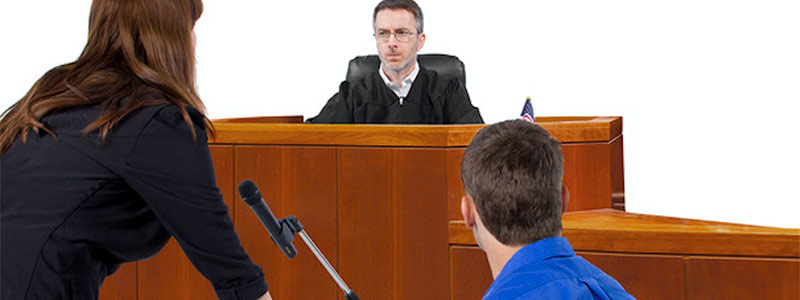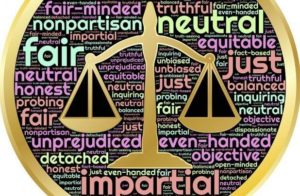
09 May Best Practices for Witness Preparation
I was talking to a friend and colleague recently about all the in-person work we’re starting to get in court, both civil and criminal. She mentioned, in passing, that she had received a call to prepare a witness for trial. The conversation turned to the issue of having separate interpreters for witness preparation and then testimony at trial. I brought it up with another friend and colleague afterwards, which made me realize this is something that warrants a carefully thought-out best practices guideline for interpreters in legal settings.
Who calls a witness?
In criminal matters, both the prosecution and the defense will take the testimony on direct examination only of their own witnesses. Cross-examination is conducted by the opposing party. When either side prepares a witness for trial, they go over their own questions and try to anticipate what opposing counsel will ask, which will be mostly yes-or-no questions. Attorneys will advise their witnesses to listen carefully to each question and answer only what they are asked.
In civil matters, each side gets a chance to depose—that is, take the testimony under oath—of the other side’s witnesses before a trial takes place. They get to hear what the other side’s testimonial evidence will be if the case ever goes before a judge and a jury. Preparing a witness for a deposition is very different from the preparation of a witness for a criminal trial. Since the attorney doing the preparation is not the one who will be asking the questions, it all boils down to anticipating the adversary’s questions on direct.
Who hires the interpreter?
In criminal matters, each side will hire their own interpreter for the preparation of their witnesses. During trial, however, witnesses for the defense will have an interpreter appointed by the court, which will most likely will be the same interpreter—or team of interpreters—appointed for the defendant. The prosecution, however, should bring their own interpreters for their witnesses, and not use the court-appointed interpreters. In the federal jurisdiction, this is a fiscal matter: the Department of Justice’s budget is separate from the Executive Branch’s budget from which interpreters get paid when appointed by the courts. In state courts, it’s a matter of caselaw: the defense interpreters should not be “borrowed” to interpret for the prosecution witnesses.[1]
In civil matters, each party is responsible for hiring their own interpreters for litigants and witnesses at trial. For depositions, however, the party hiring the interpreter is the one conducting the direct examination, so it will be the opposing party for that particular witness.
Is there a conflict?
Sign-language interpreters have a standing rule not to interpret for the same witness during preparation and subsequent testimony at trial. There are scientific and empirical grounds for this separation of interpreter engagements, based on the way in which the brain processes visual versus auditory information and how it is stored in short- and long-term memory.[2] That same evidence would support the opposite rule for spoken-language interpreters.
Our professional community has not taken an official position on the question of an inherent conflict when interpreting for the same witness during preparation and testimony. Given the fact that attorneys and judges are not always aware of our ethical duties to safeguard attorney-client confidentiality and to remain impartial at all times, we find ourselves too often in the crosshairs of unfounded objections. Having the same interpreter for witness preparation and testimony on the record should seem like an ideal arrangement. All terminological questions would be resolved during preparation, and in the end, the actual testimony on the record should be flawlessly rendered. Clearly, there should be no conflict whatsoever when the same party hires the interpreter for preparation and testimony.
What happens when it is one party who hires the interpreter for witness preparation and a different party who hires the interpreter for trial or deposition testimony? Can it be the same interpreter? Should it be different interpreters?
Perception versus reality
Do interpreters become part of the “plaintiff’s team” or the “defendant’s team” by virtue of their having been engaged in the witness-preparation phase of a case?
If a freelance interpreter is hired by the court to interpret for a defendant during any stage of a criminal matter, does that disqualify the interpreter from being hired by the prosecution to interpret in any out-of-court or in-court proceeding in the same case? Or, conversely, does having been hired by the prosecution at any stage of a case disqualify an interpreter from being hired by the court to interpret for the defendant in that same case?
 Answering these questions in the affirmative necessarily assumes that the interpreter cannot remain impartial regardless of who does the hiring. It also assumes the interpreter will not safeguard the confidentiality of anything interpreted previously. Limiting an interpreter’s ability to be engaged with any of the parties in the same case at any stage of the proceedings calls into question the very moral fiber of that interpreter and, by extension, all interpreters.
Answering these questions in the affirmative necessarily assumes that the interpreter cannot remain impartial regardless of who does the hiring. It also assumes the interpreter will not safeguard the confidentiality of anything interpreted previously. Limiting an interpreter’s ability to be engaged with any of the parties in the same case at any stage of the proceedings calls into question the very moral fiber of that interpreter and, by extension, all interpreters.
Of course, we can always recuse ourselves if we feel we cannot remain impartial. That is also part of our ethical alignment, and doing so is a reflection of our professionalism. But it is quite detrimental to our profession when we allow misinformed attorneys and judges to impose limitations and restrictions on our professional practice and standards.
Conclusions
If we take for granted that interpreters are abiding by their ethical duties to remain impartial and protect confidential communications, there is no reason to acquiesce to a compartmentalized practice that limits when and where an interpreter can be professionally engaged. It is up to each one of us, of course, to enlighten our clients and stakeholders. Each one of us has a duty to educate stakeholders about the ethical scaffolding upon which we build our practice every single day, so the reality of the judiciary interpreting profession prevails over any misinformed perceptions.
[1] U.S. v. Mayans, 17 F.3d 1174 (9th Cir. 1994.).
[2] Cohen, Michael A., et al. “Auditory recognition memory is inferior to visual recognition memory.” PNAS, Vol. 106, No. 14 (2009). https://www.pnas.org/doi/10.1073/pnas.0811884106; “What do we remember better–What we see or what we hear?” Science ABC, updated 16 Jan 2022. https://www.scienceabc.com/humans/what-do-we-remember-better-what-we-see-or-what-we-hear.html.

Janis Palma has been a federally certified English<>Spanish judiciary interpreter since 1981. Her experience includes conference work in the private sector and seminar interpreting for the U.S. State Department. She has been a consultant for various higher education institutions, professional associations, and government agencies on judiciary interpreting and translating issues. She worked as an independent contractor for over twenty years in federal, state, and immigration courts around the U.S. before taking a full-time job. Janis joined the U.S. District Courts in Puerto Rico as a staff interpreter in April 2002 and retired in 2017. She now lives in San Antonio, Texas, embracing the joys of being a grandmother. She also enjoys volunteering for her professional associations, has been on the SSTI and TAJIT Boards, and is currently on the NAJIT Board of Directors. Contact: jpalma@najit.org
Main photo from “Falsas memorias en juicios orales” by Janeth Aldecoa at cienciamx Noticias, under Creative Commons license version 4.0. Body photo from “Neutralidad en la red o Internet abierto” by Dareus at En Clave de Derecho, under Creative Commons license version 4.0.

It’s an interesting dilemma. On what side, the ethical oath all interpreters should abide by assumes that they professionally interpret in the court what is said, plain and simple. I see no conflict of interest if utilized in this capacity in the courtroom in any role, regardless of who hired the interpreter. Interpret what is said. On the other hand, witness preparation is another matter. I see a conflict of interest if the same interpreter is hired by both sides of a hearing whether criminal trial or deposition. The fact remains that the interpreter would be exposed to the approach of one side prior to or during the preparation of the other side. That’s not something that should happen. In a courtroom, everything is recorded and can be reviewed after the fact. In a private lawyer’s office, the same doesn’t happen. There’s no check or balance in that case. I would never recommend involvement by the same interpreter for preparation of both sides of legal matter.
Thank you, Anthony. I know a lot of people share your point of view, and that is precisely why I thought I’d open up this conversation.
Anthony, you have brought up very, very interesting issues, that are worth detailing and fleshing out. In my opinion the bottom line would be: can the same interpreter remain neutral, in spite of being exposed to “other” information? This issue was brought up once in a criminal proceeding, and an interpreter told your honor, “if this interpreter interprets “blue car” during the deposition of the witness, but now the same witness says “yellow car” at the witness stand, this interpreter will interpret “yellow car”. A professional interpreter would never violate his/her Canon of Ethics, but unfortunately those who do not, cast a shadow of suspicion on those who do abide by them.
Meant to say “those who do”. We need an edit button. Lol!
On another note, there is the , “witness preparation” scenario. If the interpreter cannot check himself/herself…then what?
The most important consideration is that the interpreter remain impartial and that all parties respect the fact that they do and will remain impartial.
Janis, I think you wrote an excellent article.
Thank you, Phyllis.
Phyllis, problem solved. Or as some would say, boom, mic drop….I AGREE!
In South Carolina, according to statute section 17-1-50, Interpreters in criminal proceedings interpret the proceedings to the party, victim, and testimony of the witness. Therefore, prosecution need not hire its own interpreter for the record. However, most lawyers are not acquainted with SCACR Rule 511, Rules of Professional Conduct for Court Interpreters. A potential conflict of interest does not necessarily rule out use of an interpreter. Confidentiality and impediments to performance benefit from the same interpreters. Additionally, in small venues with few court interpreters, it’s likely that interpreters, judges, and lawyers are familiar with those who find themselves in court. The battle continues.
Thank you for that information, Emily. I mentioned some other rules and case law but the more we know, the better equipped we will be to arrive at a uniform best practice.
Excellent article. It is an issue worth “fleshing out”. US v. Bennet has very good case law where the appeals court determined no rule was broken when the court appointed a single interpreter for three defendants.
Thank you, Cristian. That is an interesting ruling. Like I told Emily, the more we know, the better equipped we will be to arrive at a uniform best practice. I hope more readers contribute their own knowledge about laws and regulations on this issue.
My pleasure, Janis. Yes! I agree! The problems arise when Court Interpreters themselves do not practice and abide by what has already been established within our professional community, and the problems are made worse, when legal actors who do not fully understand why we do what we do, implement laws, rules and regulations, that are not fully in sync with our Canon of Ethics, Standard of Operations, and Best Practices. One need only to read and understand the magnificent work done by the authors, and all those that contributed, of Fundamentals of Court Interpretation, to really understand this very important issue. Thanks again for your very insightful article!
In Hawaii State courts, the person (or team) contracted by the Judiciary to interpret at defense counsel table may also interpret at the witness stand for the attorneys for both sides *when the defendant is the witness*.
If a witness other than the defendant needs an interpreter, then another interpreter (or team) will do the witness interpreting for that person or those persons.
I remember checking with a prosecutor after the first round of interpreting for her, to see if she was satisfied with my work. She was surprised. I simply told her that my role is impartial and that my goal and hope is that both sides are satisfied with my work.
She was pleased.
I spoke to her in the presence of defense counsel (and the judge? I don’t remember that part). So everything I said to her was above board.
Thank you for sharing your experience, Marcella. I love that you mentioned “another interpreter (or team)” because lengthy testimony should also be interpreted by a team, not by a single interpreter.